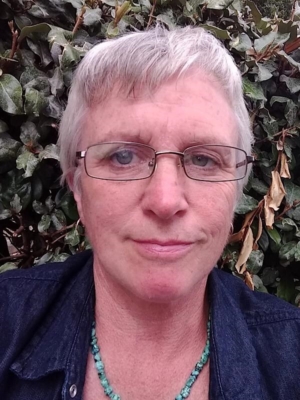Spotlight: Before the Arab Spring
[fiction]
Present Simple
It’s September, and forty-one degrees. Condensation runs
down the windows, puddles on the lino. The air-conditioning
rumbles. Ella and her new class regard each other with cautious
fascination.
The students see an alien creature with sand-colored hair,
short as a man’s; calves that are shockingly bare, eerily pale.
Ella sees young Bahrain. Jeans, T-shirts, patterned
headscarves, discreet flashes of gold. Rich boys in pure-white
robes, looking like delegates at an international conference.
Village girls in black abayas, only their faces showing. Dead
center in the front row sits a faceless black shape.
The students describe their daily routines: ride sharing,
lectures, lunch in the canteen. A girl says, “In the evening,
usually I eat chocolate and fight with my small sister.” The
black shape giggles.
* * *
Past Simple
Everyone talks about what they did last weekend. When it’s
Ella’s turn, she omits cocktails at the British Club, bacon for
breakfast, languorous morning sex. They practice question
making, and someone asks, “Teacher, how did you meet your
husband?”
It was at a party. We fell into bed together, too drunk to
perform till the next morning.
“We met at a party,” she says. “We fell in love and got
married.”
* * *
Future Simple
A change of lesson plan becomes necessary. Ella has handed
round photocopies of the horoscope pages from the Gulf News
(You will learn… You will meet someone… People with this
star sign are courageous…) in heavy silence. Finally, a thin
serious boy called Sami says, “Teacher, this isn’t true. Not from
Islam.” Others nod agreement. They do a multiple-choice
grammar quiz instead.
* * *
Describing a Person
Maryam, the girl in black, wants a word for “the person who
always understands my problems.” Ella writes sympathetic on
the whiteboard.
“Teacher,” Sami says, “what do we call the man who want to
change the government? When the government is wrong?”
Ella writes up the words dissident and revolutionary with a
side glance out of the window. She’s not sure if it’s good news
that Sami trusts her enough to ask.
It’s the mid-nineties. The Arab Spring has not yet been
invented.
* * *
Holidays in My Country
Military helicopters overfly the campus, lashing the eucalyptus
trees. Ella’s students murmur fearfully. It’s whispered that
during one demonstration, a young man was shot dead. The
Gulf News does not report this, but Ella’s parents send
newspaper cuttings from England about vicious beatings,
community leaders imprisoned, pro-democracy protestors held
without trial.
In December, the class discusses Christmas customs and the
approach of Ramadan. “In this holy month, everybody is
happy.” “When we fast, we feel sympathetic about hungry
people.” “We visit our family at night and eat a delicious
traditional food.”
Ella calls her parents and tells them she loves them.
* * *
The Weather
The students say there are only two seasons, hot and cold, but
in March the weather becomes briefly glorious. The Arabian
Gulf shimmers turquoise and green. Ella and her husband walk
in the desert, carpeted with yellow flowers after a sudden
rainstorm. Embassy advice is to stay away from Shi’a villages,
but in the distance, after Friday prayers, they see towers of
black smoke, hear the deep roar of an angry crowd. Arabic
graffiti appears on walls and telephone boxes, and is swiftly
removed.
Under the headline Terror Plot Foiled, 29 Confess, the Gulf
News prints a row of faces, young men with bruised
cheekbones and frightened eyes. One looks very much like
Sami, who has been absent for weeks. An American colleague is
deported for allowing political discussion in his class. Rumors
circulate of government spies among the students.
* * *
My Plans for the Future
When the others have left, Maryam flips her silky black veil up
and back. It’s the first time Ella has seen her face. Circled by a
tightly pinned headscarf, it’s round and pretty, but pallid as
grass hidden from sunlight.
After Maryam’s homework questions are answered, Ella
wonders why she’s still sitting silent, twisting slender black-
gloved hands in her lap. Suddenly she says, “Teacher, I am
very afraid. Soldiers came to my village at night and took away
the young men. They took my fiancé. Why, why do they do like
this? We only want the democracy.”
Ella’s heart beats too fast. The silence lengthens. Maryam
replaces her veil abruptly and rises to leave; Ella thinks she
might be crying.
Remembering another holiday is approaching, Ella calls out,
“Eid Mubarak!” but the departing black shape makes no reply.
It’s nearly exam season.
Patience Mackarness lives and writes partly in an elderly VW camper van, and partly in a cottage in Brittany, France. She has taught English in various countries, including Bahrain during the 1990s. You can read more of her work at https://patiencemackarness.wordpress.com/





